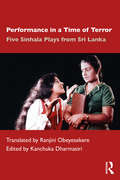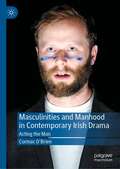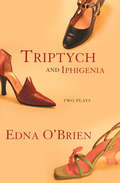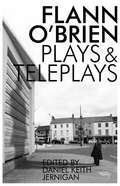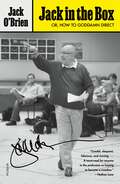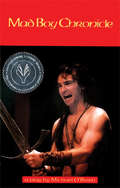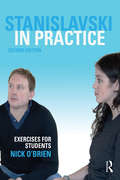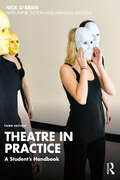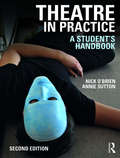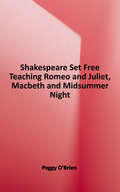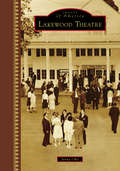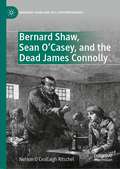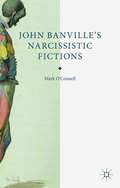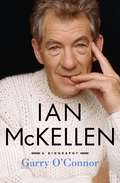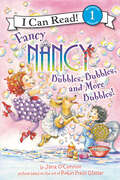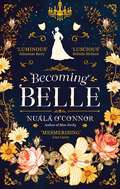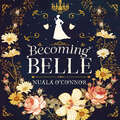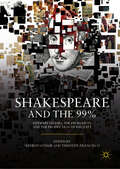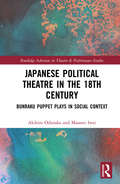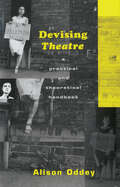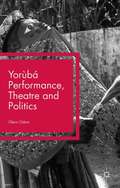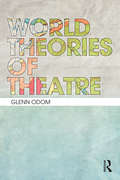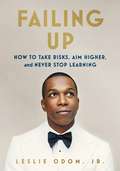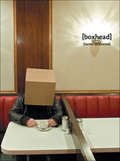- Table View
- List View
Performance in a Time of Terror: Five Sinhala Plays from Sri Lanka
by Ranjini Obeyesekere Kanchuka DharmasiriThis volume is a collection of five Sinhala plays, translated into English, which were written and performed during the most violent phase of modern Sri Lankan history. Ranjini Obeyesekere’s translation of these five well-known and celebrated plays by K. B. Herath, Prasannajith Abeysuriya, Dhananjaya Karunarathne, Prasanna Jayakody and Rajitha Dissanayake highlights and explores the dynamic period of Sri Lankan theater and performance arts in the 1980s and 1990s. The plays in this collection offered a political space for criticism, introspection, discussion and protest during a time of suppression of voices, political violence and terror. Audiences flocked to the theater to watch plays produced by talented dramatists and artists who were experimenting with forms and themes under extremely challenging circumstances, shoe-string budgets and strict censorship. Kanchuka Dharmasiri’s introduction to the volume further details the history and socio-political contexts of the theater of this period, discussing themes such as dissent, identity and the brutal power of the state. She also looks at the unique formal elements employed in these plays as well as their influence and reach. This volume is a significant addition to the growing corpus of Sinhala literature in translation. It will be an essential read for scholars and researchers of literature, performance studies, cultural studies, and the politics and history of Sri Lanka.
Masculinities and Manhood in Contemporary Irish Drama: Acting the Man
by Cormac O'BrienThis book charts the journey, in terms of both stasis and change, that masculinities and manhood have made in Irish drama, and by extension in the broader culture and society, from the 1960s to the present. Examining a diverse corpus of drama and theatre events, both mainstream and on the fringe, this study critically elaborates a seismic shift in Irish masculinities. This book argues, then, that Irish manhood has shifted from embodying and enacting post-colonial concerns of nationalism and national identity, to performing models of masculinity that are driven and moulded by the political and cultural practices of neoliberal capitalism. Masculinities and Manhood in Contemporary Irish Drama charts this shift through chapters on performing masculinity in plays set in both the Irish Republic and Northern Ireland, and through several chapters that focus on Women’s and Queer drama. It thus takes its readers on a journey: a journey that begins with an overtly patriarchal, nationalist manhood that often made direct comment on the state of the nation, and ultimately arrives at several arguably regressive forms of globalised masculinity, which are couched in misaligned notions of individualism and free-choice and that frequently perceive themselves as being in crisis.
Triptych and Iphigenia: Two Plays (Books That Changed the World)
by Edna O'BrienTwo plays by the acclaimed Irish author: an adaption of Euripides and an “emotionally bruising drama” of three women obsessed with the same man (The New York Times).TriptychWith searing acuity, O’Brien presents the story of three women—a mistress, a wife, and a daughter—who are all helplessly drawn to Henry: their lover, husband, and father. While Henry himself never appears, his specter is never absent as these women confront the ways that love can simultaneously liberate and entrap. Triptych is a powerful work that explores sex, marriage, and predatory relationships.IphigeniaIn this modern take on the Greek tragedy, O’Brien takes creative license with Euripides’s tale of a daughter sacrificed for the sake of war. This taut, contemporary version presents, in O’Brien’s own words, “a more equal representation of the power and presence of both male and female characters” (Edna O’Brien, Independent, UK).“Intriguingly original . . . emotionally brave and engagingly clever.” –R. Hurwitt, The San Francisco Chronicle
Collected Plays and Teleplays
by Flann O'Brien Daniel Keith JerniganIn the same spirit as his novels, O'Brien's plays are speculative, inventive, wickedly funny, and a delightful addition to his collected works--now available at last: this volume collects Flann O'Brien's dramatic work into a single volume, including Thirst, Faustus Kelly, and The Insect Play: A Rhapsody on Saint Stephen's Green. It also includes several plays and teleplays that have never before seen print, including The Dead Spit of Kelly (of which a film version is in production by Michael Garland), The Boy from Ballytearim, and An Scian (only recently discovered), as well as teleplays from the RTÉ series O'Dea's Your Man and Th'oul Lad of Kilsalaher.
Collected Plays and Teleplays
by Flann O'Brien Daniel Keith JerniganIn the same spirit as his novels, O'Brien's plays are speculative, inventive, wickedly funny, and a delightful addition to his collected works--now available at last: this volume collects Flann O'Brien's dramatic work into a single volume, including Thirst, Faustus Kelly, and The Insect Play: A Rhapsody on Saint Stephen's Green. It also includes several plays and teleplays that have never before seen print, including The Dead Spit of Kelly (of which a film version is in production by Michael Garland), The Boy from Ballytearim, and An Scian (only recently discovered), as well as teleplays from the RTÉ series O'Dea's Your Man and Th'oul Lad of Kilsalaher.
Jack in the Box: or, How to Goddamn Direct
by Jack O'BrienThe Tony Award–winning director gathers memories of people, productions, and problems surmounted from his fifty-year career in this one-of-a-kind how-to handbook.What do directors do? Jack O’Brien, the winner of Tony and Drama Desk Awards and the former artistic director of San Diego’s historic Old Globe theatre, describes it like this: “You stand before a situation in which something is presented to you. You’re afforded a challenge. Like catching an enormous ball. And you respond. You come up with a vision of some kind. That is, if you respond to the material at all, and one must, or it’s doomed. You sort of feel that since you relate to the material at hand, you might as well try to be helpful.”In Jack in the Box, O’Brien’s follow-up to his memoir Jack Be Nimble, the director collects stories from the many productions he has worked on, the great talents he encountered and collaborated with (including Tom Stoppard, Mike Nichols, Jerry Lewis, Marsha Mason, and many others), and the choices he made, on the stage and off, that have come to define his career. With humor, warmth, and contagious excitement, O’Brien takes the reader by the shoulder, pulls them in, and tells them how to become a director—or, at the very least, relates an unfailingly honest story of how he did.
Mad Boy Chronicle
by Michael O'Brien Liz NichollsSet in the final days of the first millennium, Mad Boy Chronicle hauls the Hamlet story howling back to its origins. Join the Mad Boy as he sets out in fierce pursuit of his destiny, in a world where wolves, elves, spirits, and Jesus Christ all compete for the future of humanity.
Stanislavski in Practice: Exercises for Students
by Nick O'BrienStanislavski in Practice is an unparalleled step-by-step guide to Stanislavski’s system. Author Nick O’Brien makes this cornerstone of acting accessible to teachers and students alike through the use of practical exercises that allow students to develop their skills. This second edition offers more exercises for the actor, and also new sections on directing and devising productions. Each element of the system is covered practically through studio exercises and jargon-free discussion. Exercises are designed to support syllabi from Edexcel, Eduqas, OCR and AQA to the practice-based requirements of BTEC and IB Theatre. This is the perfect exercise book for students and a lesson planner for teachers at post-16 and first year undergraduate level. New to this edition: Thoroughly reorganized sections, including 'Work on the Actor', 'Work on a Role' and 'Developing your Practice'; A new chapter on using Stanislavski when devising with a series of exercises that will allow students to structure and create characters within the devising process; A new chapter, Directing Exercise Programme, which will be a series of exercises that allows the student to develop their skills as a director; New glossary with US and UK terms; New exercises developed since the publication of the first edition; A new chapter going beyond Stanislavski, exploring exercises from Michael Chekhov, Maria Knebel and Katie Mitchell.
Theatre in Practice: A Student's Handbook
by Nick O'BrienTheatre in Practice, third edition, is an accessible and wide-ranging exploration of the central practices and key practitioners covered on the various syllabi at A level, IB, and at undergraduate level.Exploring Stanislavski, Brecht, Artaud, Lecoq, Berkoff, Bogart, Mitchell and Craig, as well as work from innovative theatre companies such as Tamasha, Sh!T Theatre, Complicite, Gecko and The Paper Birds, it combines an informal, unpretentious tone with a wealth of practical exercises. Revised and updated to include some of the latest practices in theatre, this new edition offers a step-by-step approach to developing key skills such as devising, improvising, rehearsing mono/duologues and directing plays.New for this edition are chapters from Nick O'Brien and Mikhaela Mahony on key female and global majority practitioners; a chapter offering a unique insight into the acting practice of award-winning actress Indira Varma; and updated information throughout.Written by specialists with extensive experience at post-16 and undergraduate level, Theatre in Practice is a thorough and imaginative resource that speaks directly to students and teachers. This book offers students a range of exercises to experience and explore key practitioners enabling them to understand theatre how it should be understood: through practice.
Theatre in Practice: A Student's Handbook
by Nick O'Brien Annie SuttonTheatre in Practice is an accessible and wide-ranging exploration of the central practices and key practitioners covered on the various syllabi at A level, IB, BTEC and beyond. Exploring Stanislavski, Brecht, Artaud, Lecoq, Berkoff and Craig, as well as work from innovative theatre companies such as Complicite, Gecko and The Paper Birds, it combines an informal, unpretentious tone with a wealth of practical exercises. Revised and updated to meet the most recent post-16 and A level drama requirements and to include some of the latest practices in theatre, this new edition offers a step-by-step approach to developing key skills such as devising, improvising, rehearsing mono/duologues and directing plays. Written by specialists with extensive experience leading workshops for the post-16 age-group, Theatre in Practice is a thorough and imaginative resource that speaks directly to students. New for this edition: A new chapter exploring Artaud and how to use Artaud with text and when devising. A new chapter exploring the progression of practice from Lecoq to Complicite. A series of step-by-step exercises exploring the Gecko devising process. An exploration of the work of The Paper Birds and E G Craig when devising. New exercises on how to devise using Stanislavski and Brecht.
Teaching a Midsummer Night's Dream, Romeo and Juliet, and Macbeth: Shakespeare Set Free (Folger Shakespeare Library)
by Peggy O'BrienThe Folger Shakespeare Library, the nation's most important center for Shakespeare study and scholarship, is also the center for Shakespeare education. At the Library's Teaching Shakespeare Institute, scholars, actors, and teachers from across the country work together in the business of teaching and learning Shakespeare. This volume of the Shakespeare Set Free series is written by institute faculty and participants and includes the latest developments in recent scholarship. It bristles with the energy created by teaching and learning Shakespeare from the text and through active performance and reflects the experience, wisdom, and wit of real classroom teachers in schools and colleges throughout the United States. In this book, you will find the following:-Clearly written essays by leading scholars to refresh teachers and challenge older students -Michael Tolaydo’s brilliant and accessible technique for classroom teaching through performance -Day-by-day teaching strategies that successfully and energetically immerse students in every grade and skill level in the language and the plays themselves – created, taught, and written by real teachers.
Lakewood Theatre (Images of America)
by Jenny ObyBeginning as a humble vaudeville hall in the Skowhegan-Madison trolley park, Lakewood Theatre has graced the southwestern shore of Lake Wesserunsett in Madison, Maine, since the turn of the 20th century. Under the masterful guidance of Herbert L. Swett, a Bangor native and Bowdoin graduate, Lakewood eventually developed into a nationally renowned playhouse that was called the “Broadway in Maine” by the New York Times in its heyday, from 1925 until World War II. In the years following the war, Lakewood was operated by Swett’s heirs and became a virtual who’s who of both Broadway and Hollywood, until it nearly went dark in the early 1980s. Operating today as a nonprofit community theater, Lakewood is the official state theater of Maine and the oldest continually running summer theater in the country.
Bernard Shaw, Sean O’Casey, and the Dead James Connolly (Bernard Shaw and His Contemporaries)
by Nelson O’Ceallaigh RitschelThis book details the Irish socialistic tracks pursued by Bernard Shaw and Sean O’Casey, mostly after 1916, that were arguably impacted by the executed James Connolly. The historical context is carefully unearthed, stretching from its 1894 roots via W. B. Yeats’ dream of Shaw as a menacing, yet grinning sewing machine, to Shaw’s and O’Casey’s 1928 masterworks. In the process, Shaw’s War Issues for Irishmen, Annajanska, the Bolshevik Empress, The Tragedy of an Elderly Gentleman, Saint Joan, The Intelligent Woman’s Guide to Socialism and Capitalism, and O’Casey’s The Story of the Irish Citizen Army, The Shadow of a Gunman, Juno and the Paycock, The Plough and the Stars, and The Silver Tassie are reconsidered, revealing previously undiscovered textures to the masterworks. All of which provides a rethinking, a reconsideration of Ireland’s great drama of the 1920s, as well as furthering the knowledge of Shaw, O’Casey, and Connolly.
John Banville’s Narcissistic Fictions: The Spectral Self
by Mark O’ConnellIn reading Banville's novels through the work of key psychoanalytical theorists, John Banville's Narcissistic Fictions brings together apparently disparate thematic strands - missing twins, shame, false identities - and presents these as manifestations of a central concern with narcissism.
Ian McKellen: A Biography
by Garry O'ConnorThe definitive biography of Sir Ian McKellen from an acclaimed biographer In 2001, Ian McKellen put on the robe and pointed hat of a wizard named Gandalf and won a place in the hearts of Tolkien fans worldwide. Though his role in the film adaptation of Lord of the Rings introduced him to a new audience, McKellen had a thriving career a lifetime before his visit to Middle Earth. He made his West End acting debut in 1964 in James Saunders’s A Scent of Flowers, but it was in 1980 that he took Broadway by storm when he played Antonio Salieri in Peter Shaffer’s Tony-Award-winning play Amadeus.He has starred in over four hundred plays and films and he is that rare character: a celebrity whose distinguished political and social service has transcended his international fame to reach beyond the stage and screen. The breadth of his career—professional, personal and political—has been truly staggering: Macbeth (opposite Judi Dench), Iago, King Lear, Chekhov’s Sorin in The Seagull and Becket’s tramp Estragon (opposite Patrick Stewart) in Waiting for Godot. Add to all this his tireless political activism in the cause of gay equality and you have a veritable phenomenon. Garry O’Connor’s Ian McKellen: A Biography probes the heart of the actor, recreating his greatest stage roles and exploring his personal life. Ian McKellen will show readers what makes a great actor tick. His life story has been a constantly developing drama and this biography is the next chapter.
Fancy Nancy: Bubbles, Bubbles, and More Bubbles! (I Can Read Level 1)
by Jane O'ConnorFancy Nancy and her class are going to see The Big Bubble Show!Nancy and Bree can’t wait to go. But when Bree gets sick and has to miss the show, Nancy decides to put on a bubble show of her own. Will Nancy and her classmates be able to put on the best bubble show ever?From the beloved New York Times bestselling author-illustrator team Jane O’Connor and Robin Preiss Glasser, Fancy Nancy: Bubbles, Bubbles, and More Bubbles is a Level One I Can Read, perfect for children learning to sound out words and sentences.
Becoming Belle
by Nuala O'Connor'Luminous' SEBASTIAN BARRY'Incandescent characters and mellifluous prose' LISA CAREY'Reminiscent of Edith Wharton at her very best' LIZ NUGENT_________The true story of a woman ahead of her time . . . In 1887, Isabel Bilton is the eldest of three daughters of a middle-class military family, growing up in a small garrison town. By 1891 she is the Countess of Clancarty, dubbed "the peasant countess" by the press, and a member of the Irish aristocracy. Becoming Belle is the story of the four years in between, of Belle's rapid ascent and the people that tried to tear her down. Reimagined by a novelist at the height of her powers, Belle is an unforgettable woman. Set against an absorbing portrait of Victorian London, hers is a timeless rags-to-riches story a la Becky Sharpe._________Praise for BECOMING BELLE'Nuala O'Connor has the thrilling ability to step back nimbly and enter the deep dance of time. This is a hidden history laid luminously before us of an exultant Anglo-Irish woman navigating the dark shoals and the bright fields of a life' SEBASTIAN BARRY, award-winning author of The Secret Scripture and Days Without End'Becoming Belle is so mesmerizing you will be distraught when it ends.O'Connor has resurrected a fiery, inexorable woman who rewrites the script on a stage supposedly ruled by men. Sensual, witty, daring, and unapologetically forward.' Lisa Carey, author of The Stolen Child'Belle's determination to live her life on her own terms and in defiance of her times makes her a fascinating subject' Irish Central'Masterful storytelling! I was putty in Nuala O'Connor's hands. She made the unsinkable Belle Bilton and her down-to-earth sister Flo real to me, and brought 1880's London to my living room. Encore! Encore!' Lynn Cullen, bestselling author of Mrs. Poe'A glorious novel in which Belle Bilton and 19th century London are brought roaring to life with exquisite period detail' Hazel Gaynor, New York Times bestselling author of A Memory of Violets'Thoroughly engrossing and entertaining read' Liz Nugent'Thrillingly dramatic and achingly moving and profoundly resonant into this present era' Robert Olen Butler, author of A Good Scent from a Strange Mountain'O'Connor gently unfolds Belle's tale in a manner that is compelling and disarming. The ambience may be Victorian elegance but the sheer honesty of O'Connor's writing is sensual, authentic and earthy. A delight!' Rose Servitova, author of The Longbourn Letters
Becoming Belle
by Nuala O'Connor'Luminous' SEBASTIAN BARRY'Incandescent characters and mellifluous prose' LISA CAREY'Reminiscent of Edith Wharton at her very best' LIZ NUGENT_________The true story of a woman ahead of her time . . . In 1887, Isabel Bilton is the eldest of three daughters of a middle-class military family, growing up in a small garrison town. By 1891 she is the Countess of Clancarty, dubbed "the peasant countess" by the press, and a member of the Irish aristocracy. Becoming Belle is the story of the four years in between, of Belle's rapid ascent and the people that tried to tear her down. Reimagined by a novelist at the height of her powers, Belle is an unforgettable woman. Set against an absorbing portrait of Victorian London, hers is a timeless rags-to-riches story a la Becky Sharpe._________Praise for BECOMING BELLE'Nuala O'Connor has the thrilling ability to step back nimbly and enter the deep dance of time. This is a hidden history laid luminously before us of an exultant Anglo-Irish woman navigating the dark shoals and the bright fields of a life' SEBASTIAN BARRY, award-winning author of The Secret Scripture and Days Without End'Becoming Belle is so mesmerizing you will be distraught when it ends.O'Connor has resurrected a fiery, inexorable woman who rewrites the script on a stage supposedly ruled by men. Sensual, witty, daring, and unapologetically forward.' Lisa Carey, author of The Stolen Child'Belle's determination to live her life on her own terms and in defiance of her times makes her a fascinating subject' Irish Central'Masterful storytelling! I was putty in Nuala O'Connor's hands. She made the unsinkable Belle Bilton and her down-to-earth sister Flo real to me, and brought 1880's London to my living room. Encore! Encore!' Lynn Cullen, bestselling author of Mrs. Poe'A glorious novel in which Belle Bilton and 19th century London are brought roaring to life with exquisite period detail' Hazel Gaynor, New York Times bestselling author of A Memory of Violets'Thoroughly engrossing and entertaining read' Liz Nugent'Thrillingly dramatic and achingly moving and profoundly resonant into this present era' Robert Olen Butler, author of A Good Scent from a Strange Mountain'O'Connor gently unfolds Belle's tale in a manner that is compelling and disarming. The ambience may be Victorian elegance but the sheer honesty of O'Connor's writing is sensual, authentic and earthy. A delight!' Rose Servitova, author of The Longbourn Letters
Shakespeare and the 99%: Literary Studies, the Profession, and the Production of Inequity
by Sharon O'Dair Timothy FranciscoThrough the discursive political lenses of Occupy Wall Street and the 99%, this volume of essays examines the study of Shakespeare and of literature more generally in today’s climate of educational and professional uncertainty. Acknowledging the problematic relationship of higher education to the production of inequity and hierarchy in our society, essays in this book examine the profession, our pedagogy, and our scholarship in an effort to direct Shakespeare studies, literary studies, and higher education itself toward greater equity for students and professors. Covering a range of topics from diverse positions and perspectives, these essays confront and question foundational assumptions about higher education, and hence society, including intellectual merit and institutional status. These essays comprise a timely conversation critical for understanding our profession in “post-Occupy” America.
Japanese Political Theatre in the 18th Century: Bunraku Puppet Plays in Social Context (Routledge Advances in Theatre & Performance Studies)
by Akihiro Odanaka Masami IwaiBunraku has fascinated theatre practitioners through its particular forms of staging, such as highly elaborated manipulation of puppets and exquisite coordination of chanters and shamisen players. However, Bunraku lacks scholarship dedicated to translating not only the language but also cultural barriers of this work. In this book, Odanaka and Iwai tackle the wealth of bunraku plays underrepresented in English through rexamining their siginifcance on a global scale. Little is written on the fact that bunraku theatre, despites its elegant figures of puppets and exotic stories, was often made as a place to manifest the political concerns of playwrights in the 18th century, hence a reflection of the audience's expectation that could not have materialized outside the theatre. Japanese Political Theatre in the 18th Century aims to make bunraku texts readable for those who are interested in the political and cultural implications of this revered theatre tradition.
Devising Theatre: A Practical and Theoretical Handbook
by Alison OddeyDevising Theatre is a practical handbook that combines a critical analysis of contemporary devised theatre practice with descriptions of selected companies, and suggestions for any group devising theatre from scratch. It is the first book to propose a general theory of devised theatre. After identifying the unique nature of this type of performance, the author examines how devised theatre is perceived by professional practitioners, and provides an historical overview illustrating how it has evolved since the 1960s. Alison Oddey examines the particular working practices and products of a number of professional companies, including a Reminiscence theatre for the elderly and a theatre-in-education group, and offers ideas and exercises for exploration and experimentation.
Yorùbá Performance, Theatre and Politics
by Glenn OdomThis book explains the connections between traditional performance (e.g. masked dances, prophecy, praise recitations), contemporary theatre (Wole Soyinka, Ola Rotimi, Tess Onwueme, Femi Osofisan, and Stella Oyedepo) , and the political sphere in the context of the Yorùbá people in Nigeria.
World Theories of Theatre
by Glenn A. OdomWorld Theories of Theatre expands the horizons of theatrical theory beyond the West, providing the tools essential for a truly global approach to theatre. Identifying major debates in theatrical theory from around the world, combining discussions of the key theoretical questions facing theatre studies with extended excerpts from primary materials, specific primary materials, case studies and coverage of Southern Africa, the Caribbean, North Africa and the Middle East, Oceania, Latin America, East Asia, and India. The volume is divided into three sections: Theoretical questions, which applies cross-cultural perspectives to key issues from aesthetics to postcolonialism, interculturalism, and globalization. Cultural and literary theory, which is organised by region, presenting a range of theatrical theories in their historical and cultural context. Practical exercises, which provides a brief series of suggestions for physical exploration of these theoretical concepts. World Theories of Theatre presents fresh, vital ways of thinking about the theatre, highlighting the extraordinary diversity of approaches available to scholars and students of theatre studies. This volume includes theoretical excerpts from: Zeami Motokiyo Bharata Muni Wole Soyinka Femi Osofisan Uptal Dutt Saadallah Wannous Enrique Buenaventura Derek Walcott Werewere Liking Maryrose Casey Augusto Boal Tadashi Suzuki Jiao Juyin Oriza Hirata Gao Xingjian Roma Potiki Poile Sengupta
Failing Up: How to Take Risks, Aim Higher, and Never Stop Learning
by Leslie Odom Jr.Leslie Odom Jr., burst on the scene in 2015, originating the role of Aaron Burr in the Broadway musical phenomenon Hamilton. Since then, he has performed for sold-out audiences, sung for the Obamas at the White House, and won a Tony Award for Best Leading Actor in a Musical. But before he landed the role of a lifetime in one of the biggest musicals of all time, Odom put in years of hard work as a singer and an actor.With personal stories from his life, Odom asks the questions that will help you unlock your true potential and achieve your goals even when they seem impossible. What work did you put in today that will help you improve tomorrow? How do you surround yourself with people who will care about your dreams as much as you do? How do you know when to play it safe and when to risk it all for something bigger and better?These stories will inspire you, motivate you, and empower you for the greatness that lies ahead, whether you’re graduating from college, starting a new job, or just looking to live each day to the fullest.
[boxhead]
by Darren O'DonnellDr. Thoughtless Actions, a young geneticist, awakes one morning to find a cardboard box secured to his head. Unable to wrench it off, he attempts suicide, not only failing but also, unbeknownst to himself, cloning himself, creating Dr. Wishful Thinking. The two losers fall in love, fall in science, and fail to make a baby. Their conversation, an intricately woven semantic circus, traverses boxedness, love, and the more ridiculous areas of metaphysical speculation. Through a series of rapid exchanges, verbal games, and musical numbers, they discover that all their thoughts come from God, all their words come from the devil, and their desire for love is a habit acquired from the cinema. Sound familiar? Don't be so hard on yourself. [boxhead]: a bedtime story for your brain.
